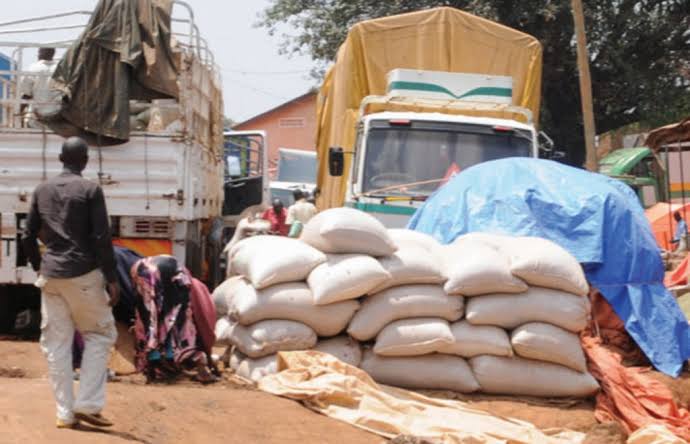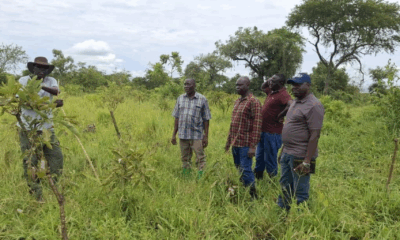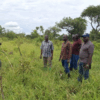Business
Barriers to trade a great danger to food security in the region
The East African region is experiencing unprecedented obstacles to food trade, hurting livelihoods and derailing economic progress.
Food insecurity, in its various forms, is one of the most significant challenges facing East African region and the wider Nile Basin member countries. About 140 million people in the basin (or 34 percent of the population of the basin states) are undernourished, with the level of severity varying from country to country, according to the ‘State of the Nile Basin’ report 2012.
A rapidly growing population, coupled with increasing urbanisation and climate change, point to a worsening food security situation.
Trade is usually one of the ways by which countries meet their food requirements, beyond what they can produce locally. The region possesses immense untapped potential not only to meet its own food needs but also to grow extra food to support other counties and use proceeds to improve the economies of the region.
This potential to use food trade between member countries of the Nile Basin, however, faces numerous challenges. Several studies carried out on the subject of food security point to the low levels of production within member countries and generally much of Africa, as the most significant impediment to food trade.
Too little is produced, leaving households with nothing left for sale. In Uganda, for example, one of the major food producers in the region, subsistence farming still accounts for more than 50 percent of the country’s farming households, according to the Uganda Census 2014.
Lack of investments and old-fashioned techniques
The challenge appears to stem from the lack of political will to invest in more modern means of agriculture.
Rudimentary technologies such as the use of digging sticks, inferior seeds, non-application of fertilisers and reliance on rainfall have been allowed to permeate the economies of most African countries.
This is despite numerous pronouncements by the leaders of most African countries – for example, the Malabo Declaration in which all African Union member countries unanimously agreed to invest 10 percent of their national budgets in agriculture.
The lack of investment in agriculture triggers a vicious cycle of poverty and underproduction, especially when one considers the fact that population growth has for several years now exceeded growth in the agricultural sector.
Closely tied with the archaic technologies of food production, is the lack of investment in storage, value addition, transportation and marketing infrastructure and development or harmonisation of standards to facilitate trade in food crops.
In a 2012 Nile Basin Initiative (NBI) report entitled ‘An analysis of Cross-border Trade in Agricultural Products along Selected Corridors of the Nile Basin Region’, it was revealed for example that most traders rely on rooms in residential homes to keep stocks for food commodities such as maize, beans, and potatoes.
It is under such circumstances that quality and hence, the safety of food is compromised. Professor Archileo Kaaya of the Makerere University in Uganda argues that poor storage and processing of grains such as maize and groundnuts is a major entry point for fungi that cause poisonous chemicals commonly known as aflatoxins.
These toxins multiply in moist and warm conditions and are known to cause cancer of the liver when continuously eaten, and instant death when consumed in high doses.
In October 2018, the Uganda Grain Council, one of the largest grain exporters from Uganda suffered significant losses when its consignment of maize exports was blocked from accessing the Kenyan market.
The Ugandan maize was found to contain aflatoxins exceeding the prescribed maximum of 10 μg/kg by the East African Community.
Trade politics
Beyond the capacity challenges of food production, Nile Basin countries face numerous other challenges that frustrate, delay or outrightly impede the exchange of food within national boundaries or across borders of member countries.
Political and other administrative constraints have very often prevented trade from happening even among countries that profess free movement of goods and services such as the East African Community where members signed up to a common market.
The closure of the border between Rwanda and Uganda close to two years ago and the recent blockade by Kenya on the importation of Uganda’s maize, chicken, milk and eggs is another reminder of how urgent leaders and the entire community needs to get our heads around to address this challenge.
And this example of complicated trade politics is not the only one. The Tanzanian government has at least twice during the past six years stopped traders from exporting food items to neighbouring countries.
Insecurity arising from political or civil conflicts, as has been experienced in South Sudan, Burundi and DRC in recent years has proven very costly for producers and traders. In March 2019, the government of Uganda paid out UGX 48 billion, (USD 13 million) to some of the Ugandan traders as partial compensation for the losses they incurred when South Sudan plunged into civil war in 2013.
Tariff and non-tariff barriers
Whereas nine of the ten member countries in the Nile Basin belong to a common market either under the Common Market for Eastern and Southern Africa (COMESA) or the East African Community (EAC), where members have decided to remove tariffs on goods and services generally, Nile Basin countries still impose taxes on a wide range of food items.
This is usually done under what countries consider a ‘sensitive list’ of goods that must be deregulated and therefore still attract high tariffs, with adverse effects to free movement of food from surplus to deficit areas.
The government of Ethiopia also still considers the informal trade in livestock with neighbouring countries such as Kenya as illegal, since it denies the government the much-needed foreign exchange, according to an NBI study on food trade.
Non-tariff barriers such as extortion by traffic police officers, multiple taxes, and red tape by customs officers duringhe process of clearing vehicles result into needless delays of up to seven hours, as is the case in Busia, on the Uganda-Kenya border.
Resorting to informal paths as a way to avoid delays and illegal fees is a common practice especially by traders of perishable foods. But it helps only in saving time. The resultant impact on the cost of transferring the food has been estimated by the NBI study to be as high as 50 percent of the cost of transfer fees.
The NBI estimates that non-tariff barriers constitute as much as 50 percent for traders in Uganda, 35 percent in Kenya and 12 percent in Tanzania.
In the final analysis, while some measures have been made to open up borders through economic liberalisation, the same measures pale in comparison with the need to scale up production and increase other capacities.
The NBI has been categorical in warning that the region’s food security future looks very precarious if no deliberate action is taken.
It urged in its ‘State of the River Nile Basin 2012 Report’ that:“Clearly the Nile countries must boost food production if they are to avert major food crises, which have the potential to erode and wipe out past gains in socio-economic development.”
Comments




























